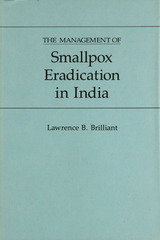
This book is a study of the variable perceptions of Greek collective identity, discussing ancient categories such as blood- and mythically-related primordiality, language, religion, and culture. With less emphasis on dichotomies between Greeks and others, the book considers complex middle grounds of intra-Hellenic perceptions, oppositional identities, and outsiders’ views. Although the authors do not seek to provide a litmus test of Greek identity, they do pay close attention to modern theories of ethnicity, its construction, function, and representation, and assess their applicability to views of Greekness in antiquity.
From the Archaic period through the Roman Empire, archaeological, anthropological, historical, historiographical, rhetorical, artistic, and literary aspects are studied. Regardless of the invented aspects of ethnicity, the book illustrates its force and validity in history.

Kitharoidia was arguably the most popular, most geographically widespread, and longest-running performance genre in antiquity. From the archaic period to the late Roman imperial era, citharodes enjoyed star status, playing their songs to vast crowds at festival competitions and concerts throughout the Mediterranean world.
The Culture of Kitharoidia is the first study dedicated exclusively to the art, practice, and charismatic persona of the citharode. Traversing a wide range of discourse and imagery about kitharoidia—poetic and prose texts, iconography, inscriptions—the book offers a nuanced account of the aesthetic and sociocultural complexities of citharodic song and examines the iconic role of the songmakers in the popular imagination, from mythical citharodes such as Orpheus to the controversial innovator Timotheus, to that most notorious of musical dilettantes, Nero.
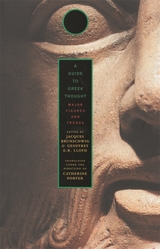

Hellenistic history.
The historian Polybius (ca. 200–118 BC) was born into a leading family of Megalopolis in the Peloponnese (Morea) and served the Achaean League in arms and diplomacy for many years, favoring alliance with Rome. From 168 to 151 he was held hostage in Rome, where he became a friend of Lucius Aemilius Paulus and his two sons, especially Scipio Aemilianus, whose campaigns, including the destruction of Carthage, he later attended. Late in his life he became a trusted mediator between Greece and the Romans; helped in the discussions that preceded the final war with Carthage; and after 146 was entrusted by the Romans with the details of administration in Greece.
Polybius’ overall theme is how and why the Romans spread their power as they did. The main part of his history covers the years 264–146 BC, describing the rise of Rome, her destruction of Carthage, and her eventual domination of the Greek world. It is a great work: accurate, thoughtful, largely impartial, based on research, and full of insight into customs, institutions, geography, the causes of events, and the character of peoples. It is a vital achievement of the first importance despite the incomplete state in which all but the first five of its original forty books have reached us.
For this edition, W. R. Paton’s excellent translation, first published in 1922, has been thoroughly revised, the Büttner-Wobst Greek text corrected, and explanatory notes and a new introduction added, all reflecting the latest scholarship.
The Loeb Classical Library edition of Polybius is in six volumes.

Hellenistic history.
The historian Polybius (ca. 200–118 BC) was born into a leading family of Megalopolis in the Peloponnese (Morea) and served the Achaean League in arms and diplomacy for many years, favoring alliance with Rome. From 168 to 151 he was held hostage in Rome, where he became a friend of Lucius Aemilius Paulus and his two sons, especially Scipio Aemilianus, whose campaigns, including the destruction of Carthage, he later attended. Late in his life he became a trusted mediator between Greece and the Romans; helped in the discussions that preceded the final war with Carthage; and after 146 was entrusted by the Romans with the details of administration in Greece.
Polybius’ overall theme is how and why the Romans spread their power as they did. The main part of his history covers the years 264–146 BC, describing the rise of Rome, her destruction of Carthage, and her eventual domination of the Greek world. It is a great work: accurate, thoughtful, largely impartial, based on research, and full of insight into customs, institutions, geography, the causes of events, and the character of peoples. It is a vital achievement of the first importance despite the incomplete state in which all but the first five of its original forty books have reached us.
For this edition, W. R. Paton’s excellent translation, first published in 1922, has been thoroughly revised, the Büttner-Wobst Greek text corrected, and explanatory notes and a new introduction added, all reflecting the latest scholarship.
The Loeb Classical Library edition of Polybius is in six volumes.

Hellenistic history.
The historian Polybius (ca. 200–118 BC) was born into a leading family of Megalopolis in the Peloponnese (Morea) and served the Achaean League in arms and diplomacy for many years, favoring alliance with Rome. From 168 to 151 he was held hostage in Rome, where he became a friend of Lucius Aemilius Paulus and his two sons, especially Scipio Aemilianus, whose campaigns, including the destruction of Carthage, he later attended. Late in his life he became a trusted mediator between Greece and the Romans; helped in the discussions that preceded the final war with Carthage; and after 146 was entrusted by the Romans with the details of administration in Greece.
Polybius’ overall theme is how and why the Romans spread their power as they did. The main part of his history covers the years 264–146 BC, describing the rise of Rome, her destruction of Carthage, and her eventual domination of the Greek world. It is a great work: accurate, thoughtful, largely impartial, based on research, and full of insight into customs, institutions, geography, the causes of events, and the character of peoples. It is a vital achievement of the first importance despite the incomplete state in which all but the first five of its original forty books have reached us.
For this edition, W. R. Paton’s excellent translation, first published in 1922, has been thoroughly revised, the Büttner-Wobst Greek text corrected, and explanatory notes and a new introduction added, all reflecting the latest scholarship.
The Loeb Classical Library edition of Polybius is in six volumes.

Hellenistic history.
The historian Polybius (ca. 200–118 BC) was born into a leading family of Megalopolis in the Peloponnese (Morea) and served the Achaean League in arms and diplomacy for many years, favoring alliance with Rome. From 168 to 151 he was held hostage in Rome, where he became a friend of Lucius Aemilius Paulus and his two sons, especially Scipio Aemilianus, whose campaigns, including the destruction of Carthage, he later attended. Late in his life he became a trusted mediator between Greece and the Romans; helped in the discussions that preceded the final war with Carthage; and after 146 was entrusted by the Romans with the details of administration in Greece.
Polybius’ overall theme is how and why the Romans spread their power as they did. The main part of his history covers the years 264–146 BC, describing the rise of Rome, her destruction of Carthage, and her eventual domination of the Greek world. It is a great work: accurate, thoughtful, largely impartial, based on research, and full of insight into customs, institutions, geography, the causes of events, and the character of peoples. It is a vital achievement of the first importance despite the incomplete state in which all but the first five of its original forty books have reached us.
For this edition, W. R. Paton’s excellent translation, first published in 1922, has been thoroughly revised, the Büttner-Wobst Greek text corrected, and explanatory notes and a new introduction added, all reflecting the latest scholarship.
The Loeb Classical Library edition of Polybius is in six volumes.
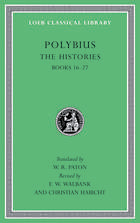
Hellenistic history.
The historian Polybius (ca. 200–118 BC) was born into a leading family of Megalopolis in the Peloponnese (Morea) and served the Achaean League in arms and diplomacy for many years, favoring alliance with Rome. From 168 to 151 he was held hostage in Rome, where he became a friend of Lucius Aemilius Paulus and his two sons, especially Scipio Aemilianus, whose campaigns, including the destruction of Carthage, he later attended. Late in his life he became a trusted mediator between Greece and the Romans; helped in the discussions that preceded the final war with Carthage; and after 146 was entrusted by the Romans with the details of administration in Greece.
Polybius’ overall theme is how and why the Romans spread their power as they did. The main part of his history covers the years 264–146 BC, describing the rise of Rome, her destruction of Carthage, and her eventual domination of the Greek world. It is a great work: accurate, thoughtful, largely impartial, based on research, and full of insight into customs, institutions, geography, the causes of events, and the character of peoples. It is a vital achievement of the first importance despite the incomplete state in which all but the first five of its original forty books have reached us.
For this edition, W. R. Paton’s excellent translation, first published in 1922, has been thoroughly revised, the Büttner-Wobst Greek text corrected, and explanatory notes and a new introduction added, all reflecting the latest scholarship.
The Loeb Classical Library edition of Polybius is in six volumes.

Hellenistic history.
The historian Polybius (ca. 200–118 BC) was born into a leading family of Megalopolis in the Peloponnese (Morea) and served the Achaean League in arms and diplomacy for many years, favoring alliance with Rome. From 168 to 151 he was held hostage in Rome, where he became a friend of Lucius Aemilius Paulus and his two sons, especially Scipio Aemilianus, whose campaigns, including the destruction of Carthage, he later attended. Late in his life he became a trusted mediator between Greece and the Romans; helped in the discussions that preceded the final war with Carthage; and after 146 was entrusted by the Romans with the details of administration in Greece.
Polybius’ overall theme is how and why the Romans spread their power as they did. The main part of his history covers the years 264–146 BC, describing the rise of Rome, her destruction of Carthage, and her eventual domination of the Greek world. It is a great work: accurate, thoughtful, largely impartial, based on research, and full of insight into customs, institutions, geography, the causes of events, and the character of peoples. It is a vital achievement of the first importance despite the incomplete state in which all but the first five of its original forty books have reached us.
For this edition, W. R. Paton’s excellent translation, first published in 1922, has been thoroughly revised, the Büttner-Wobst Greek text corrected, and explanatory notes and a new introduction added, all reflecting the latest scholarship.
The Loeb Classical Library edition of Polybius is in six volumes.
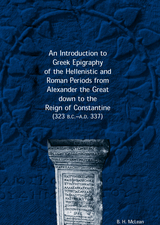
“In short, this is a reference work of the best kind. For the beginner, it is indispensable. And for those who already know something about its subject matter, the book is in many ways useful, informative, and interesting. We all owe a debt to [the author] for undertaking this significant project, and for completing it so well.”
—Michael Peachin, Classical World
“. . . provides invaluable road maps for non-epigraphers faced with passages of inscribed Greek.”
—Graham Shipley, Bryn Mawr Classical Review
Greek inscriptions form a valuable resource for the study of all aspects of the Greco-Roman world. They are primary witnesses to society's laws and institutions, religious habits, and language. This volume provides students with the tools to take advantage of the historical value of these treasures. It examines letter forms, ancient names, and ancient calendars, knowledge of which is essential in reading inscriptions of all kinds.
B. H. McLean discusses the classification of inscriptions into their various categories and analyzes particular types of inscriptions, including decrees, honorary inscriptions, dedications, funerary inscriptions, and manumissions. Finally, McLean includes special topics that bear upon the interpretation of specific features of inscriptions, such as Greek and Roman administrative titles and functions.
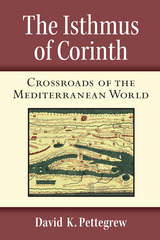
David Pettegrew’s book offers a new history of the Isthmus of Corinth from the Romans’ initial presence in Greece during the Hellenistic era to the epic transformations of the Empire in late antiquity. A new interpretation of the extensive literary evidence outlines how the Isthmus became the most famous land bridge of the ancient world, central to maritime interests of Corinth, and a medium for Rome’s conquest, annexation, and administration in the Greek east. A fresh synthesis of archaeological evidence and the results of a recent intensive survey on the Isthmus describe the physical development of fortifications, settlements, harbors, roads, and sanctuaries in the region. The author includes chapters on the classical background of the concept isthmos, the sacking of Corinth and the defeat of the Achaean League, colonization in the Late Roman Republic, the Emperor Nero’s canal project and its failure, the growth of Roman settlement in the territory, and the end of athletic contests at Isthmia. The Isthmus of Corinth offers a powerful case study in the ways that shifting Mediterranean worlds transformed a culturally significant landscape over the course of a millennium.
READERS
Browse our collection.
PUBLISHERS
See BiblioVault's publisher services.
STUDENT SERVICES
Files for college accessibility offices.
UChicago Accessibility Resources
home | accessibility | search | about | contact us
BiblioVault ® 2001 - 2025
The University of Chicago Press





